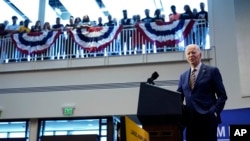As the United States teeters on the edge of a government shutdown, U.S. President Joe Biden on Thursday decried the Republican budget plan — which he dubbed “MAGAnomics” — in a speech in which he also defended his administration’s economic agenda.
“For all the time they spend attacking me and my plan ... they never talk about what they want to do,” Biden told his audience at Prince George’s Community College in Largo, Maryland.
"Their plan — MAGAnomics — is more extreme than anything America has ever seen before,” Biden said.
In his speech, Biden denounced Republican plans to lower taxes for the wealthy and corporations and cut programs like Social Security, Medicare and Medicaid. Tens of millions of Americans would be at risk of losing their health insurance under the Republican plan, Biden estimated.
Push for spending cuts
House Republicans are demanding that spending for fiscal 2024 be cut to $1.47 trillion, which is about $120 billion less than Biden and Republican House Speaker Kevin McCarthy agreed to in a May deal on the debt ceiling. The White House and Senate leaders — including Senate Republican leader Mitch McConnell — have rejected that request.
“They’re back at it again, breaking their commitment, threatening more cuts and threatening to shut down government again,” Biden said Thursday.
Unless a long- or short-term funding bill is passed by September 30, the federal government will enter its fourth shutdown in a decade.
In turn, Biden has introduced his own economic plan — “Bidenomics” — that would restructure the American economy by investing in green energy, manufacturing and infrastructure.
Bidenomics is about “investing in America and investing in Americans,” the president said Thursday.
Jared Bernstein, chair of the Council of Economic Advisers, told reporters during a White House briefing Wednesday that Biden would use his speech “to lay out the very clean contrast between Bidenomics and the congressional Republicans’ trickle-down economic plan — a plan that has failed working families every time it’s been tried.”
Bump in costs to consumers
U.S. consumer prices jumped by the most in more than a year in August, mostly rising higher on an increase in gasoline prices, the government said Wednesday. However, analysts say underlying price pressures were tame enough that the country’s central bank may not see the need to increase its benchmark interest rate at its meeting next week.
The country’s consumer price index edged higher last month by 3.7% on an annualized basis, after a 3.2% increase in July, the Labor Department said. Prices were up 0.6% in August over July after increasing by 0.2% for two straight months.
McConnell said on X, formerly known as Twitter, that inflation data released Wednesday “brought more bad news for working families.”
“Pain at the pump. Declining real wages. [The president] says Bidenomics is working. … But it sure isn’t working for the American people,” McConnell said.
Even with the higher prices, analysts said policymakers at the central bank, the Federal Reserve, could refrain from increasing their benchmark borrowing rate at next week’s meeting, waiting for further evidence of the country’s inflation track.
The Fed attempts to adopt policies that keep the increase in U.S. consumer prices at an annualized rate of 2%. It has raised the benchmark rate 11 times in the last year and a half to curb borrowing and spending to tame inflation, which reached a recent peak of 9.1% in June 2022. The Fed’s key borrowing rate courses through the U.S. economy, helping establish loan interest rates for businesses and consumers.
Greg McBride, the chief financial analyst at Bankrate.com, said in a statement, “The Federal Reserve is poised to hold interest rates steady at their meeting next week but there are still some concerns within this [consumer price] report — gasoline prices, motor vehicle insurance, maintenance and repair — that the Fed won’t dispel the idea of an additional interest rate hike before year-end.”
Gasoline prices
The key culprit in the August inflation increase was the rising price of gasoline, which peaked at nearly $4 for 3.8 liters in the third week of the month.
In a statement, Biden, who is campaigning for reelection in 2024, took note of the economic trends.
"Overall inflation has also fallen substantially over the last year, but I know last month’s increase in gas prices put a strain on family budgets,” he said, pledging to work to get fuel prices down.
In national polling, Americans who are particularly conscious of their household expenses have given Biden poor marks for his handling of the economy. Biden in turn noted in his statement, “Unemployment has remained below 4% for 19 months in a row, the share of working-age Americans with a job is the highest in 20 years, and real wages are higher now than they were before the pandemic.”
U.S. economic fortunes are certain to be a key factor in next year's presidential contest, with Biden’s Republican opponents blaming him for higher inflation because of increased government spending he supported.
Biden said the money for infrastructure repairs helped create thousands of new jobs and was needed to fix deteriorating roads and bridges.





